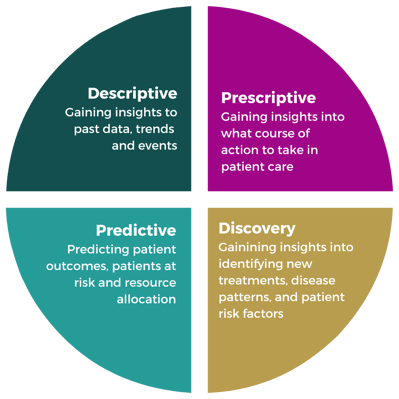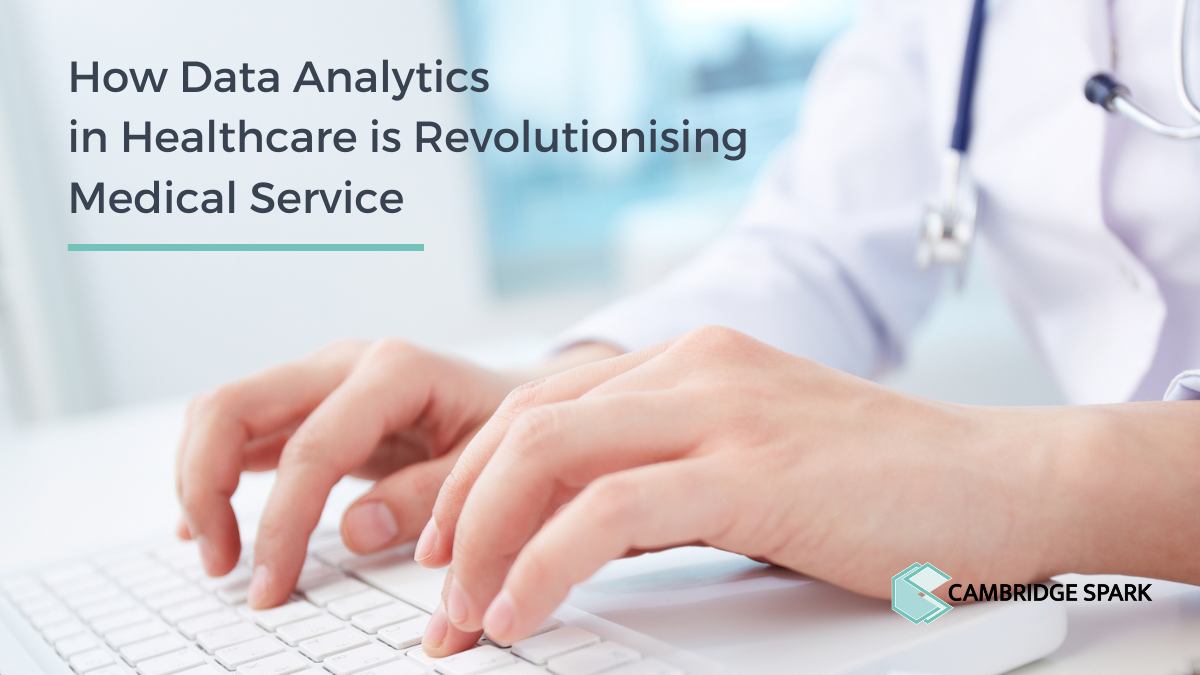Data analysis is booming in every industry. But one of the most significant industries where it’s helping to make huge leaps forward is in healthcare. Patient outcomes can be significantly improved thanks to more detailed hospital data insights that are now more readily available to us.
But these improvements are only possible if the healthcare workforce has the skills to make the most of the opportunities valuable data presents to us. Read on to discover how healthcare analytics is revolutionising medical treatment for patients.
What is data analytics in healthcare and why is it important?
Data analytics in healthcare is the process of analysing and interpreting large and complex sets of healthcare-related data to identify trends, patterns, and insights that can be used to make more informed decisions. This data can come from a variety of sources, including electronic health records (EHRs), medical imaging, clinical trials and health insurance claims amongst others.
Advanced analytics tools and techniques, such as machine learning, artificial intelligence, and statistical analysis, are used to make sense of the large volumes of data generated. The goals of analytics in healthcare can vary from improving patient outcomes to reducing healthcare costs. Analytics can also help optimise resource utilisation by providing healthcare providers and administrators with the information they need to make better data-driven decisions.
There are four main categories of healthcare data: descriptive, prescriptive, predictive and discovery. The diagram below outlines what each of these types of healthcare data provides us with. 
By using descriptive, prescriptive, predictive, and discovery analytics, healthcare providers can gain a more holistic view of patients and their data. They can better understand past events, make informed decisions about the best course of action in the present and predict future trends. Providers can also uncover new insights that can lead to more positive patient outcomes and encourage life saving interventions and treatments.
High quality data in healthcare is essential as it:
- Leads to better quality of care for patients
- Allows for successful development of practitioners
- Guides on the allocation of resources; and
- Ultimately makes healthcare services work more efficiently when it comes to their daily processes.
Examples and benefits of big data analytics in healthcare
1. Improved population health management
Population health management (PHM) is a healthcare approach that focuses on improving the health outcomes of a specific group of individuals or a population as a whole. PHM involves using data analytics and other techniques to identify the health needs and risks of a specific population and then designing and implementing interventions and strategies to improve health outcomes.
By focusing on prevention and early intervention using data analysis, PHM can help identify and address health issues before they become more severe, ultimately leading to better overall health for individuals and communities.
2. Research and prediction of disease
By analysing large amounts of medical data, researchers can identify patterns or trends that suggest the onset of a particular disease or condition. For example, a team at Imperial College Healthcare NHS Trust implemented a digital alert system that measures and analyses biometric data and alerts clinicians if a patient is showing signs of sepsis. The alert system helps clinicians diagnose cases of sepsis and intervene earlier with effective treatment, resulting in a 24% reduction in risk of death.
Additionally, data analysis can be used to predict the likelihood of a disease outbreak or epidemic, an especially poignant advantage of data analysis since the COVID-19 pandemic.
By analysing data on previous outbreaks or epidemics, researchers can identify patterns that suggest when and where a disease is likely to occur. Targeted interventions and prevention strategies can then be developed proactively to help reduce the impact of the disease on affected populations.
3. Personalisation of medicine
Data can play a key role in the personalisation of medicine by enabling healthcare providers to use patient-specific data to tailor treatments and therapies to individual needs. By analysing large datasets containing genetic, environmental, and lifestyle information, researchers can recognise patterns and correlations that help predict how individuals are likely to respond to certain treatments.
This can lead to the development of precision medicine, which is tailored to an individual's unique genetic makeup, medical history, and other factors. This results in not only improved patient health but also higher patient satisfaction.
4. Prevention of readmissions
Data analytics in healthcare can be a valuable tool in preventing hospital readmissions as recently discovered by David Howell from Surrey Heartlands Health and Care Partnership.
Howell used his data analysis skills to build a machine learning model that reliably predicts 70-80% of emergency readmissions.
By analysing large amounts of patient data, healthcare providers can identify patterns and trends that may contribute to hospital readmissions, such as medication errors, poor post-discharge follow-up, or insufficient patient education. Providers can then use this information to develop targeted interventions to address these issues, such as improved discharge planning, medication reconciliation, and patient education programmes.
Data analysis can also be used to monitor patients remotely and identify early warning signs of complications, ultimately helping to save lives.
5. Better staff management
Data analysis in healthcare can help remedy poor staff management in several ways. By analysing staff performance data, such as patient satisfaction scores or productivity metrics, healthcare organisations can identify areas where staff may need additional training or support. Targeted training programs or coaching sessions can be developed to then support staff in improving their performance. Additionally, data analysis can be used to optimise staffing levels and schedules, ensuring that the right number and mix of staff are available at the right times to provide high-quality care.
For example, Paul Knox of the Mid & South Essex NHS Foundation Trust learned new skills in Excel and dashboarding that enabled him to produce automated reports. These reports allow staff to take immediate action on urgent issues. And whereas Knox would previously spend about 3.5 hours each week generating these reports, he now spends just 30 seconds per week since acquiring the right analytics skills. This translates to a time savings of 182 hours per year.
Who uses data analytics in healthcare?
A wide range of healthcare professionals use data analytics to accomplish a variety of goals within the industry, including health data analysts, clinicians, researchers, administrators, and policymakers:
Health data analysts - use data analytics to inform clinical decision-making and improve patient outcomes. For example, using data to identify high-risk patients, track disease progression, and evaluate the effectiveness of treatments.
Researchers - use data analytics to study disease patterns, identify risk factors, and develop new treatments and interventions.
Administrators - use data analytics to improve operations, optimise staffing levels, and manage costs.
Policymakers - use data analytics to inform healthcare policies, develop regulations, and allocate resources.
.webp?width=1050&height=591&name=Blog%20images%20(29).webp)
Challenges of big data in healthcare and how to overcome them
Here are the main challenges the healthcare industry is facing with implementing data analysis and what steps can be taken to overcome these challenges:
1. Poor data quality
High quality data is extremely important when it comes to hospital data insights, however healthcare data is often incomplete, inconsistent, and stored in different formats across various systems and departments. Data quality issues can affect the accuracy and reliability of analytics results, leading to incorrect conclusions, recommendations and poor decision making.
But there are a number of strategies that can be implemented to overcome the challenge of poor data quality. For example, conducting regular data audits can identify inaccuracies within the data and allow for prompt corrections. Using machine learning and artificial intelligence can also identify patterns and trends much more efficiently than manual analysis, saving time and resources.
2. Data privacy and security
Healthcare data contains sensitive and personal information, which makes it essential to ensure that data is protected against unauthorised access, theft, or breaches. Organisations can promote better data security by:
- Ensuring that organisations adhere to privacy regulations, such as GDPR
- Training staff on privacy and security protocols; and
- Regularly assessing risk to identify potential vulnerabilities to patient data
3. Integration with existing systems and adoption issues
Healthcare data is usually distributed across multiple systems, making it challenging to integrate and analyse data from different sources.
The implementation and adoption of new data analytics tools and techniques in healthcare organisations can also be a slow and challenging process, due to various reasons, such as:
- Resistance to change
- Lack of understanding of data analytics benefits; and
- The perceived high costs associated with implementation
It’s important to educate workforces on the incredible improvements data analysis can help achieve within the industry.
David Howell, from the Surrey Heartlands Health and Care Partnership said:
"There’s clearly a lack of implementation of machine learning within healthcare. I think people don’t necessarily see how these insights and analytics teams could be used to really start to help patients and citizens more proactively. And I was really keen to lead by example and actually take people on that journey."
4. Lack of analytical expertise
Healthcare data analytics requires a high level of expertise. The shortage of skilled data analysts who understand healthcare processes and data sources is a significant challenge and requires specific upskilling in data analysis. But sufficient skills can be taught through appropriate training, such as government-funded data analysis apprenticeships.
The future of big data analytics in healthcare
Abby Echave, Senior Business Intelligence Analyst from the NHS said:
“Data analysis is moving so quickly, there's so many languages and different software. It was important for my personal development to know what else was out there and get a head start on what's coming in the future.”
As more healthcare data is digitised, and advanced analytics tools and techniques become available, we can expect to see more accurate diagnoses, personalised treatment plans, and better outcomes for patients. Thanks to advances in machine learning, natural language processing, and computer vision, healthcare professionals will be able to automatically analyse larger amounts of data.
Data analytics in healthcare will also play a vital role in identifying high-risk patients, allowing for early intervention to prevent or manage chronic conditions and larger epidemics. And when it comes to clinical research, data analytics will help identify new treatments and therapies by analysing large-scale clinical trials and real-world data.
At Cambridge Spark, we offer data and AI apprenticeships tailored specifically for people working within the NHS. From building data literacy in Excel, through to earning a MSc-level qualification in artificial intelligence, we’re here to empower the data transformation of every healthcare organisation. Get in touch with us today to start your data-driven journey into the future of healthcare.




